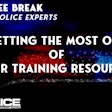 You can learn a lot by scanning. Take a set amount of time each day to learn what's happening in law enforcement. PoliceMag.com is a good source.Photo: Getty Images
You can learn a lot by scanning. Take a set amount of time each day to learn what's happening in law enforcement. PoliceMag.com is a good source.Photo: Getty Images
Law enforcement professionals who are ready to promote to sergeant should have reached a certain level of mastery over their current non-ranking position(s). It is certainly preferable to have some diversity of assignments such as patrol, investigations, or traffic, and some collateral duties such as FTO, range master, or defensive tactics instructor. But that's just the beginning.
College education and completed degrees are important and departmental involvement is always welcomed. Examples include serving as a Police Explorer advisor, committee member, or team/project volunteer. A strong record of advanced officer training; good performance evaluations; professional relationships; and demonstrated traits that include leadership, sound decision-making, integrity, organizational advocacy, and a strong work ethic all help to identify quality promotional candidates who have achieved promotional readiness.
The idea is to exemplify a candidate who has been around that law enforcement block and represent a seasoned professional who has no other place to go but up. The trick is to also stand out from the others vying for the same coveted position.
Consider Scarcity
The most life destroying word of all is the word tomorrow.
—Richard Kiyosaki
There is an area of light psychology called the law of scarcity, which is used heavily in marketing and advertising, as well as in the art of how to persuade people. The law of scarcity simply means the less of something there is (rarity), the more we want it, admire it, or hold it at higher value.
Look at singer Susan Boyle. When she first walked on stage to perform on the TV show "Britain's Got Talent," you could see on the judges' faces that they were less than impressed and the audience was snickering and rolling their eyes. At 47, Susan was much older than the other contestants and her quirky personality was viewed as silly, when in reality it was a display of overt confidence. Of course she could not control her age or physical appearance. However, once she started singing, the judges were shocked. She had people in the audience crying and she received a standing ovation in the first 30 seconds of her song. She became an overnight sensation. Watch her performance on YouTube; it's very inspiring.
Recruiting, Retaining, and Supervising the Best
Today Boyle is a multi-millionaire and a respected international celebrity. Everyone in that theater thought, "Where the hell did that come from?" Your goal in your interview and testing process is to shoot for that same "wow" reaction from the panel, the raters, or your chief.
What Ms. Boyle had was exclusivity. Very few people can sing like her, thus her audience felt privileged and honored to experience her rare (scarce) talent. If you think that she was lucky to be born with that talent or her skill is just the benefit of nature or genetics, you're kidding yourself. She had been singing—practicing—to achieve her dream for 35 years. So ask yourself, what can you do in the non-ranking years of your career to make yourself scarce or exclusive; disunited from the rest of the crowd like a diamond among a pile of rocks? First, start preparing now…right now.
We understand the contemporary preparatory efforts that most of us share: diversity of assignments, ancillary duties, longevity, training, stellar performance evaluations, and education. These are often shared by all candidates at varied levels, so if this is all you have you risk blending into the pack. In the years prior to your sergeant's promotion, consider taking a proactive strategy to make yourself exclusive or at least more competitive.
Expertise
Work to methodically develop one or more levels of expertise in a particular topic. Utilize targeted training, self-directed learning and study, school, subject matter expert interviews, field experience, authorship, and teaching. Where is there a need for expertise that most others don't have? Identify these gaps and then fill one by becoming an authority in that area.
Get Published
Not many officers have had their writing published. There are many law enforcement publications, including POLICE, that utilize officers and deputies as contributing authors. With a little research, practice, and editorial mentoring, wouldn't it be nice to be a published author, especially where others competing against you are not? As I promoted through the ranks, you can bet I told the panel and mentioned in my resume that I had more than 50 published articles with subject matter content that included leadership, ethics, risk management, training, and career development. By making this a hobby over the years, where others did not, I made myself exclusive. Anyone can do the same with a little effort.
Focused Training
Many of us have a good record of training classes, seminars, and in-service courses. Unfortunately, most of the training your organization sends you to is advanced officer training (AOT) that encompasses on-the-job skills and knowledge and not career development/advancement training. Even officers who attend training of their own volition often select the cool stuff like narcotics, shooting/tactics, or what I call "run down the alley, jump over the fence, and kick in the door" type of training.
When preparing for your sergeant's promotion, consider courses that have a strong nexus to the position being tested for. Consider classes and seminars on supervision, leadership, ethics, risk management, decision making, officers' rights or discipline, and communication skills. It is great to take AOT courses, but a well-rounded candidate has a nice blending of AOT and a focused effort toward supervisory-related training.
Conduct Interviews
When I coach promotional candidates, I suggest to them that they identify the person in their agency who conducts or oversees internal affairs investigations and pick a person that they know or are comfortable with. Then I instruct them to contact that person and invite them out for a pizza to learn about the disciplinary process and departmental internal investigations. During this lunch meeting, they should ask this person everything they ever wanted to know about officers' rights, discipline, and how the internal affairs process works. The more in-depth the interview and the more information obtained, the more effective the meeting will be. If an officer does this, after only an hour, he or she will know more about this subject than 90% of the rest of the organization and all for the small price of a pizza.
This is a great example of conducting a simple interview for promotional preparation. If you want to be a sergeant, interview your best sergeants and one or two of your most talented lieutenants. Ask them questions like:
- Where do you see the department going in the next 3 to 5 years?
- What are the biggest challenges when promoting from line to supervision?
- What are the top qualities you think a great sergeant should possess?
By conducting such interviews, you are building valuable insight into the position you are testing for and you are developing usable knowledge that can be applied to many aspects of your testing process.
Scanning
Many police executives take advantage of a simple technique called scanning. Take a set amount of time each day or several times per week and dedicate it to tapping into what is going on in your own "industry." Scan carefully chosen websites, informational resources, or news sources to ensure you are up on current events, not just locally, but also nationally. Make yourself aware of tomorrow's technology, case law, new equipment, the latest law enforcement trends, blogs, informational videos, or relevant legislation. Scanning, over time, creates a candidate who is well informed, connected, and a professional who has a broadened view to see beyond his or her own backyard.
Digital Library
There are dozens of sources for promotional candidates to get a variety of articles, newsletters, journals, white papers, case studies, and research materials to be used for study, preparation, and knowledge building. The key to success is organization. Consider creating your own digital library. This is as simple as creating a file called Promotion Preparation. Over your years of preparation, all the things you read, study, search for, and research can be downloaded into your promotion preparation file. As you develop the file, you can create sub-folders such as leadership, supervision, risk management, case law, sergeant/lieutenant interviews, how to motivate others, and book reading lists. Other sub-folders might include training to attend, oral interview articles, assessment center testing, blog websites, newsletter subscriptions, or tactics articles.
Imagine over months or years, if developed regularly, how in-depth this organized digital library could become. The tremendous informational value of dozens of folders containing hundreds of articles and information sources could be used not just to advance your career skill and knowledge, but also for your promotional preparatory efforts.
More Than Prepared
In addition to these preparatory recommendations, consider becoming an instructor or trainer in any capacity. Ensure you are an excellent writer so you'll be prepared for the promotional written test exercises and do whatever it takes to be skilled at and comfortable speaking in front of others to be ready for the promotional panel oral interview. Dedicating yourself to diverse preparation over time and with a well developed strategy is the key to success.
How To Deal With Being Passed Over for Promotion
Andy Borrello is a retired police captain and 27-year veteran of the San Gabriel (CA) Police Department. He is a California POST master instructor and the author of Police Promotion Super Course. Borello serves as a career development coach helping officers advance their careers. He welcomes inquiries at www.policepromote.com.













